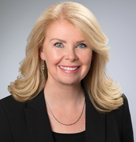Physician Thriving: Why vs. Why Not
By Hilary McClafferty, MD, FAAP
In this incredibly busy flu season, have you had the experience of working beside a physician colleague who was having a bad day, week, or month? Perhaps providing a running negative commentary something like this:
“Why is this patient here now?”
“Why don’t they have a primary care doctor?”
“Why didn’t they follow their discharge instructions?”
“Why did they come here and not the trauma center?”
“Why didn’t they fill their prescriptions?”
“Why did they show up at the last minute?”
And so on….
The fact is that this type of relentless negativity (internal or vocalized) is discouraging, exhausting, demoralizing, and contagious. It is also a signature of burnout, especially when it occurs chronically. Although it is easier to spot in others, perhaps the person doing the complaining is actually you?
Are you repeatedly pushing back against the reality of your work experience? Working in a state of perpetual discontent? Consciously or unconsciously resisting your situation, disrespecting your patients, and eroding your own peace of mind while clouding the atmosphere around you with frustration? If so, you are not alone.
If you recognize yourself in this scenario it might be a wake-up call. No one outside of medicine can truly understand the time, energy, and sacrifice you make to simply do your job. No one outside medicine can really be expected to. The reality is that the physician leader sets the tone for the team and may not fully realize the negative impact they may be having on coworkers, themselves, or patients. Your simple presence can be a powerful positive or strongly negative influence.
Maybe energy spent complaining and resisting may be better used in other ways. In fact, the “why” questions are rarely useful in these examples. People come to the doctor because they need help. It is not really more complicated than that. There is no great value in overthinking it. They need help for whatever reason, and you have chosen to be there to help them.
I believe a more useful question may be to ask, “Why not?”
“Why not?” promotes a more realistic awareness and creates a shift in perspective that invites you to remain mindful in the moment, acknowledge the patient’s needs and challenges, and accept their human flaws. “Why not” gives an opportunity to remain open without resentment. It allows you to substitute compassion (awareness paired with a desire to ease suffering) for frustration or exasperation. Compassion practiced well does not deplete, it energizes, and softens the rough edge of potentially difficult interpersonal interactions, helping one recognize the patient’s humanity and remember you chose this work, trained for this service, and are doing your best in a very complex business.
Recognizing your work attitude can serve as a valuable self-diagnostic tool. If you are teetering on the slope of frustration, at risk of falling into the chronic negative “why” trap, view it a flashing yellow warning for burnout. Shift your focus to your own wellbeing and consider harnessing the power of “why” in a more productive way.
How could a reframe change your behavior in the patient interaction?
“I wonder why that patient is here again? What is really driving their visit?”
“Why were they not able to fill their prescription?”
“Why did they not understand the discharge instructions?”
If you find that exercise hard, naïve, or unpalatable, simply view it as a skill to be practiced.
If you feel cynical about patient motivation or overwhelmed by the sheer volume of humanity seeking care, you are not alone. You may simply be exhausted. Or experiencing some stage of burnout. Of course, it is understood that the burden of care does not rest solely on your shoulders. But many physicians struggle with the perception that they are responsible in unrealistic ways, for everything. It is simply not so. Shifting to a more compassionate interface in the moment does not imply that you are gullible, or can, or will, fix everything. But it does provide you a healthier and more effective strategy for these interactions.
And to go a step further, I wonder if asking a better question will ultimately provide you a different result? For example:
“Why am I being so negative?”
“Why am I hesitating to address my own needs?”
“Why am I not taking steps to address chronic anger or frustration?”
“Why am I remaining in a job where I am unhappy, disrespected or underappreciated?”
What do you have to lose by trying a new approach and anticipating a better outcome?
 Hilary McClafferty, MD, FAAP, is board certified in pediatrics, pediatric emergency medicine, and integrative medicine. She writes and speaks nationally on physician wellbeing, resiliency, and whole physician wellness. She is a member of the International Coach Federation, certified physician coach, certified in Positive Psychology and Well-Being Coaching, and author of two books: Mind-Body Medicine in Clinical Practice and Integrative Pediatrics: Art, Science, and Clinical Application, and editor of three Special Editions on the use of integrative medicine in practice. She is Founding Director of the Pediatric Integrative Medicine in Residency program, University of Arizona, and Medical Director, Pediatric Emergency Medicine at Tucson Medical Center, Tucson, AZ. Email: mcclaffertyh@gmail.com Website: www.drmcclafferty.com Twitter: @drmcclafferty
Hilary McClafferty, MD, FAAP, is board certified in pediatrics, pediatric emergency medicine, and integrative medicine. She writes and speaks nationally on physician wellbeing, resiliency, and whole physician wellness. She is a member of the International Coach Federation, certified physician coach, certified in Positive Psychology and Well-Being Coaching, and author of two books: Mind-Body Medicine in Clinical Practice and Integrative Pediatrics: Art, Science, and Clinical Application, and editor of three Special Editions on the use of integrative medicine in practice. She is Founding Director of the Pediatric Integrative Medicine in Residency program, University of Arizona, and Medical Director, Pediatric Emergency Medicine at Tucson Medical Center, Tucson, AZ. Email: mcclaffertyh@gmail.com Website: www.drmcclafferty.com Twitter: @drmcclafferty










